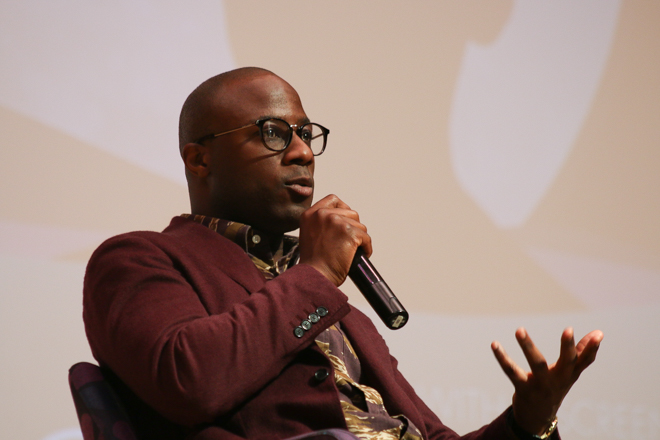
Moonlight director Barry Jenkins speaks to a sold-out Tech audotirium following a screening of his Oscar-winning film.
Photo by Mia Zanzucchi / North by Northwestern
In Barry Jenkins' mind, Moonlight was made for three entities: himself, Tarell Alvin McCraney and the city of Miami.
By adapting McCraney’s play In Moonlight Black Boys Look Blue and bringing the story of a Black, gay man in Miami's Liberty City to life, Jenkins knows the conversation the film has created has been tough for those in the community he and McCraney grew up in.
“I think there were certain things that exist out in the open that we just don't talk about,” Jenkins said Saturday night at Northwestern. “I think the results of the show has changed the way people see themselves in the neighborhood … People are talking about it.”
Those conversations are exactly the ones the organizations that brought Jenkins to NU – A&O Productions, the Contemporary Thought Speaker Series, Inspire Media and Rainbow Alliance – are trying to have. To do so, they brought Jenkins, the Oscar-winning writer and director of Moonlight, to Tech auditorium for a sold-out discussion with Radio, Television, Film Associate Professor Thomas Bradshaw after a screening of the best picture winner.
Met with a standing ovation from the audience, Jenkins quickly delved deep into the mechanics of filmmaking and representation of authentic experiences in film during his discussion with Bradshaw, who is an acclaimed playwright.
As a former Florida State University film major and Liberty City native, Jenkins not only touched on the impact the film has had on the community he grew up in, but also the importance of pursuing art from a lived experience.
Originally adapted from a play written by McCraney, Moonlight follows the life of a Black, gay boy growing up in a community where suppressing who he was and his identity was the only way to survive – all the while, living with a crack-addicted mother. Although Jenkins said the adaptation of McCraney's play into a film really worked for him because “Tarell’s life and my life were so in sync,” he couldn’t have adapted the work into a screenplay without McCraney’s help.
As a straight, Black man, “There’s a ceiling on how far empathy can get you as an artist,” Jenkins said. “It would've been quite arrogant of me to assume I know what that feels like ... Imagination is not a substitute for actual lived experience.”
“If we can only be authentic to our own lived experiences, that seems very limiting as an artist,” Bradshaw said in response.
“Stay in your lane, bruh. Your lane is beautiful,” Jenkins replied as the crowd broke into laughter.
Staying true to his experiences to create the low-budget film led to ingenuity within the filmmaking. Jenkins said he saw every challenge as an opportunity. Creating the film on a low-budget meant there were no rehearsals before any of the scenes were filmed. All of the actors, with an exception of about three, had never even been involved in acting until filming began.
Perhaps most importantly, in a response to a question by SESP sophomore Michelle Zhang on how he worked to break from traditional film styles that were catered around white skin, Jenkins talked about how instead of powdering faces, the crew used oil to capture the glow of Black skin.
“You learn the rules and break the shit out of them,” Jenkins said.
For Communication junior Sarayah Wright, this very idea – of filming Black people – is what resonated with her the most outside of the themes of the movie as a fellow filmmaker who wants to represent Blackness in her work.
“I think what Barry Jenkins was saying is a rearticulation of how we see Black people literally on film,” Wright said.
In the end, Jenkins said Moonlightwas meant to capture “Black male masculinity in a very particular time and particular place,” where masculinity was policed and defined, and often used as a tool for survival.
“I’ve seen it with my own eyes,” Jenkins said. “Now you’ve seen it. So we’re even.”
Since he only saw himself and McCraney as two Black boys from Miami, Jenkins said winning best picture for Moonlight “was a dream I had never allowed myself to have.” However, the film's success transformed the way the Liberty City community sees itself, he said, so boys like McCraney, Chiron and Jankins himself growing up there now can hopefully experience what he experienced at the peak of Moonlight’s recognition: “I felt my whole life in that moment.”